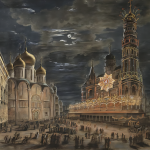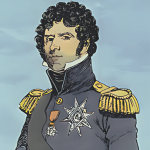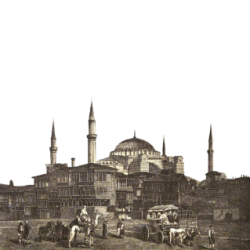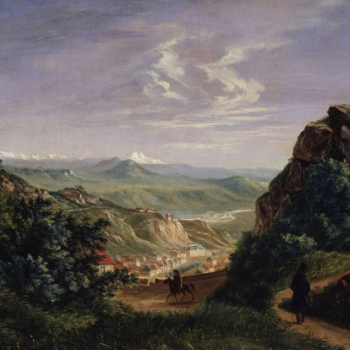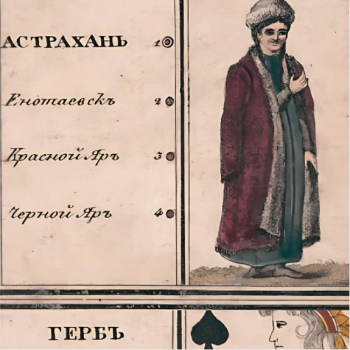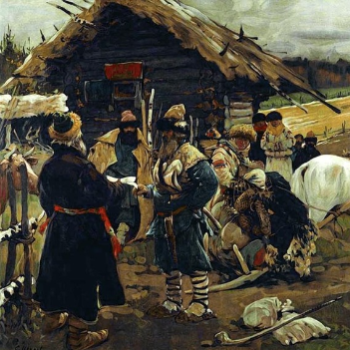A Tournament Of Shadows:
IX. The Oginsky Canal
In 1802 Mikhail Ilyich was appointed Director Of Economy for the Oginsky Canal in the Minsk Province. Andrei Mikhailovich was pleased with the long journey when moving there. Along the way, they spent several days in Polotsk and he was fascinated by the art gallery and cabinet of curiosities in the Jesuit-operated Saint Eufrosyne Monastery. The Oginsky Canal was the brainchild of Michael Kazimierz Oginsky (a statesman from the Polish-Lithuanian Commonwealth,) that connected the Yaselda River and the Shchara River, and thus connected the Baltic Sea with the Black Sea. It seemed that it was built more for show than for durability, and those who worked under the supervisor of construction, Ivan Ivanovich Falconi, were involved, per usual, in all manners of corruption. The area surrounding the canal was marshland and untamed wilderness; Mikhail Ilyich and his family, as was the case with all administrators involved in the project, lived very near to the construction site.
Andrei Mikhailovich was twelve years old when he was enlisted into service. Such a determination was not associated with any formalities, or, at least, they were avoided without fear. No birth certificates, certificates of origin, nor were certificates of training required. Andrei Mikhailovich was assigned under his father’s command, first as a supervisor’s assistant, then as an accountant, and finally as an official in the Workshop Brigade of the Seventeenth District of Communication. Andrei Mikhailovich had little work in all these positions, and he was mainly engaged in reading and writing under the dictation of his father who, throughout his career in these positions, until he left the service in the Communications Department, was also his boss. Society for the Fadeev circle consisted of officials and neighboring landowners, from whom Andrei Mikhailovich could not learn much of anything of use. However, among them, there were several decent people whose example and influence he owed thanks that he did not become a villain.
Officials matters did not occupy Andrei Mikhailovich very much, and therefore spent his time, for the most part, reading books, greedily studying everything that came to his hand. By chance he had good books from the library of Stepan Ivanovich Lesvovsky, allegedly the illegitimate son of Nikolai Vasilyevich Repnin who served at that time as a member of the canal administration. Lesovsky, who would one day become Governor of Kursk (1826-1830,) however, served there solely to establish his estate near Telekhany, allocated from the confiscated estate of Oginsky, which was granted to Prince Repnin, along with six thousand Souls (indentured servants) of peasants, of which four hundred Souls Repnin donated to Lesvovsky. Here Andrei Mikhailovich also read Castéra’s Histoire De Catherine II, a copy of which greatly interested the boy because Oginsky had written the true accounts of the history in his annotations in the marginalia of the book.
During his ten years of service in the aforementioned services, Andrei Mikhailovich was sent three times to St, Petersburg under various official pretexts, where he lived for several months at a time. There he had the opportunity to see the entire Imperial family and all the celebrities of the time, like the envoy of Napoleon, Caulaincourt, Count de Maistre, Chancellor Count Vorontsov, and Count Nikolai Petrovich Rumyantsev. He became acquainted with the world of senior officials and was given a friendly reception by the then members of the Communications Department. One of them, Gerard, especially favored his father and therefore dined with him more than once. The Gerard family consisted, firstly, of the head of the family, eighty-six-year-old Gerard, a secret advisor and member of the Communication Department. He was a skilled hydraulics worker, and the best constructions in this regard began during the reign of Catherine the Great and were executed according to his designs and guidance by his five sons, four of whom were generals. His two daughters, too, were both married to generals. They all lived in the same house, contributed to household expenses, and lived as one family. They were lauded in St. Petersburg as an example of family harmony and love. [1]
SOURCES:
[1] Fadeyev, Andrei Mikhailovich. Vospominaniia: 1790-1867. Vysochaishe Utverzhd. Yuzhno-Russkago. Odessa, Ukraine. [Russian Empire.] (1897): Part I: 12-17.


